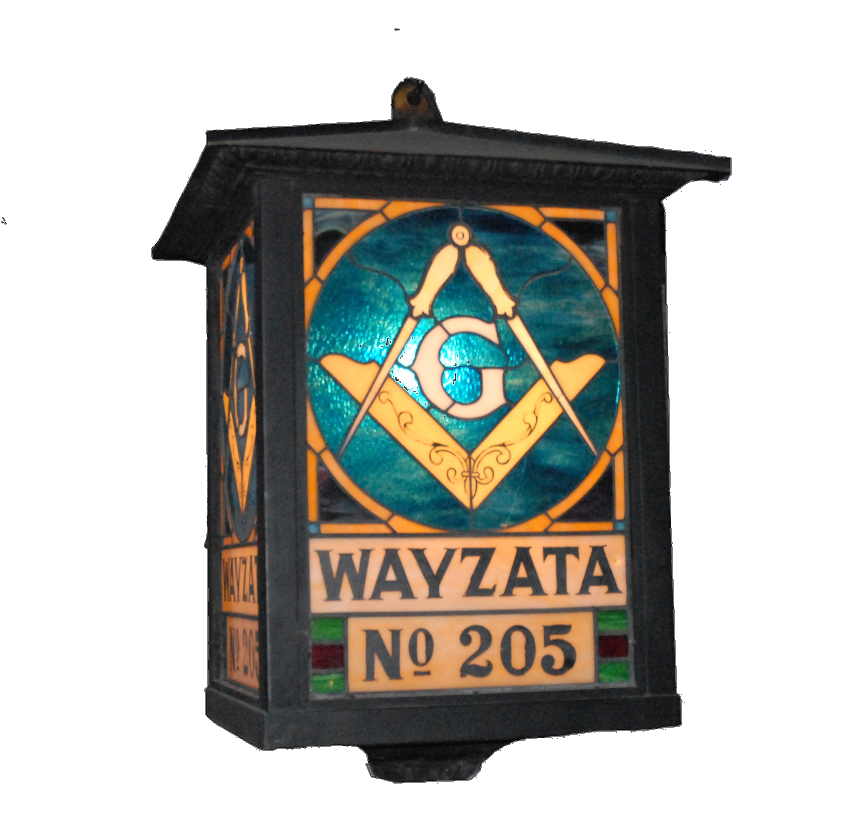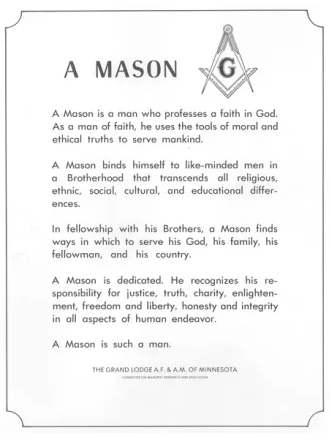
What is Freemasonry?
Introduction:
Freemasonry is one of the oldest fraternal organizations in the world. It unites men of good character who, though of different religious, ethnic or social backgrounds, share a belief in God and the brotherhood of mankind. Freemasonry offers a system or blueprint for the good man to further improve his character and actions through its system of degrees, symbols, and fellowship opportunities. Its members are taught its precepts by a series of ritual dramas, which follow ancient forms and use stonemasons’ customs and tools as allegorical guides. The United Grand Lodge of England has worldwide membership totals of more than 6 million Freemasons, 1 million of whom are in North America. The Grand Lodge of Minnesota has close to nine thousand Freemason’s within it’s jurisdiction.
When Did Freemasonry Start?
Freemasonry was established in England in 1717. Its roots are found in the guilds of stonemasons that, from the end of the 13th century, regulated the qualifications of stonemasons. As a stonemason grew in his craft, he was entered into the appropriate rank of Apprentice, Journeyman, and Master Mason.
At each stage, the craftsman was entrusted with the secrets of each level, which include passwords and grips (or handshake) made known to him only upon due inspection of necessary proficiency by a master of the craft. This way, as stonemasons migrated across Europe to the next job, each man was assured proper pay and privilege commensurate with his skill level, and clients were assured of the quality of work. Today, Freemasonry shares this same system of secrets, ritual and growth, though the work has shifted from actual buildings to building oneself in good character.
The Essential Qualification for Membership:
The essential qualification for admission into and continuing membership is a belief in a Supreme Being. Membership is open to men of any race, religion, education, country, age (18+), income, and opinion who can fulfill this essential qualification and are of good repute and character.
The Three Great Principles:
For many years Freemasons have followed three great principles:
Brotherly Love: Masons regard all humans as one family. As members of that family, Masons take an oath to act with respect and understanding toward others and to aid and support those who are in need. As Masons, we understand that everyone has their own path and their own obstacles. We aid and whisper wise counsel where we can, and offer support and protection when necessary. Freemasons take responsibility for their communities and care for the people in them. Communities are not limited by geography, and a Mason is a member of many communities through his career, faith and interests.
Relief: As Freemasons, we should help others to negotiate the obstacles in their path, if not remove them altogether. Relief can be as simple as a well-needed kindness at the right time, or an entire Lodge banding together to assist a Brother’s family. Most Masonic Relief is anonymous and rarely, if ever, talked about. It can manifest in very direct and personal ways: A mother who has to transport her child to a hospital three times a week for cancer treatments will find an envelope in her mailbox containing gas cards. A veteran in a restaurant, when asking for the check, finds that his meal has already been paid for. Or it may be as simple as stopping to assist a family with a flat tire on the side of the road. As Masons, we do not seek applause for our Relief work, because we believe that offering Relief is not a rare circumstance to be celebrated. It is the way we are supposed to behave and conduct ourselves.
Truth: As Freemasons, one of the first lessons we are taught is to be men of honor and integrity. We believe that justice is owed to each man, woman, and child because they are part of the human family under the fatherhood of God. We believe that in human endeavors, there is right and wrong, good and bad, just and unjust. For the Mason, truth ultimately is a divine attribute and the very foundation of virtue and civility and faith. We expect each Mason will act according to his understanding of Masonic teachings. In our modern, fast-moving and often isolating society, it is more important than ever that Masons seek and share these basic truths and put them into action through a life that informs, influences and inspires others.
As Freemasons, we recognize that knowledge gained should be knowledge shared; that investing time, knowledge and experience through mentoring and coaching is one of the better ways to live our Masonic principles. In our modern, fast-moving and often isolating society, it is more important than ever that Masons endeavor to seek and share these basic truths and put them into action through a life that informs, influences and inspires others.
What Does it Mean to Become a Freemason?
Throughout history, Freemasonry has provided a way for men throughout the world to live their lives to their fullest potential in association with other like minded men. This focus on the social, moral and intellectual development and well being of the individual man is unique among modern organizations. For centuries, the Masonic Lodge has been the launchpad for Masonic education, learning the values and tools required for self-improvement, enlightenment, and living a greater purpose. Through ritual, discussions and working in the community, Masons work on becoming better versions of themselves, and as importantly, helping brother Masons do the same.
Charity:
From its earliest days, Freemasonry has been concerned with the care of orphans, the sick and the aged. This work continues today. In addition, both the Grand Lodge and the local Blue Lodges of Minnesota are actively involved in many charitable activities:
Over $1 million in college scholarships have been given by the Grand Lodge, Minnesota Masonic Charities, and the Blue Lodges.
The Masonic Cancer Center was given to the University of Minnesota by the Masons of Minnesota and an additional $5.7 million has been donated for staff and equipment.
More than $20,000 is given each year to support the Veterans Hospital Visitation Program. Since 1983 the Masonic Lodges in Minnesota have donated hundreds of glucose monitors to Minnesota public schools for use by diabetic children.
The Minnesota Masonic Home provides lifetime care to elderly Masons, relatives of Masons and others who are not able to provide for themselves.
The Minnesota Masonic Foundation and the Ladd Fund are two Masonic nonprofit organizations that fund or assist many of these charities.
Masonry in the United States gives $2 million per day to charities.
What is a Masonic Lodge?
A Masonic lodge is where local Freemasons meet and work. More than the location, the lodge itself is its members and their united actions to promote Masonic values and enjoy each other’s company. The building itself can be as formal as the great Grand Lodges or as simple as a single room in a local building. Every Freemason begins his journey in the Craft in a lodge, where he receives the first three Degrees in Masonry. The traditions of the lodge are founded upon the building of King Solomon’s Temple, and its fraternal ceremonies use the working tools of the stonemasons to symbolize moral lessons of Brotherly Love, Relief and Truth.
What are the Degrees of Masonry?
The experience of becoming a member of a Masonic Lodge is divided into three ceremonial stages that Masons call “degrees.” The three degrees of Freemasonry are Entered Apprentice, Fellow Craft, and Master Mason. They are loosely based upon the journeyman system, which was used to educate Craftsmen in Medival times. Symbolically, the degrees represent the three stages of human development: youth, manhood and age.
Conclusion:
A Freemason is encouraged to do his duty first to God (by whatever name he is known) through his faith and religious practice; and then, without detriment to his family and those dependent on him, to his neighbor, community and country through charity and service.
None of these ideas is exclusively Masonic, but all should be universally acceptable. Freemasons are expected to follow them.

